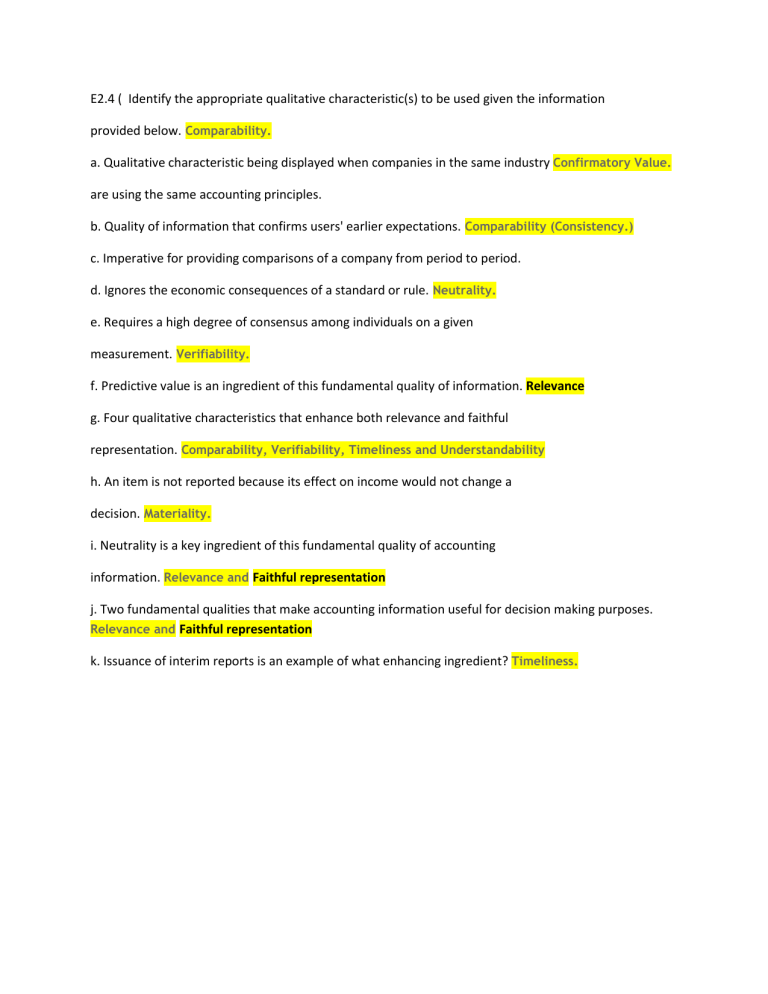

Accounting comparability is different from financial reporting quality. Just because a firm uses the same inventory valuation method as other firms in its industry does not necessarily ensure the quality of financial reporting for the related accounts (e.g., cost of goods sold). Using a large sample of over 31,000 observations for the period 1996 to 2015, we estimate that investors place a $5.40 value on $1 of higher earnings per share (EPS) reported by the average firm. However, this value is much less for firms with low accounting comparability. Accounting principles are rules and guidelines that companies must abide by when reporting financial data.
Fundamental Role of Accounting Standards in Achieving Comparability
The capacity of financial information to influence the decisions of users, ensuring that data is pertinent and applicable in a given context. Thus, International Financial Reporting Standards (IFRS) are now widely accepted. This push for a global accounting language makes financial data clearer. Thomas Richard Suozzi (born August 31, 1962) is an accomplished U.S. politician 3 important tax dates you need to know for 2016 and certified public accountant with extensive experience in public service and financial management. He is known for his pragmatic approach to fiscal policy and governance. If a company that retails leather jackets valued its inventory on the basis of FIFO method in the past, it must continue to do so in the future to preserve consistency in the reported inventory balance.
2 Internal audit quality, industry competition and accounting comparability
Comparability is achieved when an entity follows the same accounting rules that are followed by others operating within the industry. International financial reporting standards (IFRS) and generally accepted accounting principles (GAAPs) are the universally accepted accounting frameworks. Some companies implement these standards as they are, while others make necessary modifications according to the specific regulations of their countries. The competitive product market, serving as a governance mechanism, exercises supervisory and constraining functions by conveying operational pressures to management. Firstly, heightened competition in the product market diminishes information asymmetry risks, alleviates principal-agent problems, and enhances information disclosure quality in the industry. External investors are more likely to uncover self-interested managerial behavior, leading to a corresponding reduction in management actions detrimental to external shareholders.
- This aligns companies for better executive pay and favorable creditor decisions.
- Furthermore, high-tech enterprises tend to encapsulate substantial intangible resources such as core technology or knowledge, which are not fully disclosed within traditional accounting systems, potentially leading to lower information quality and comparability.
- As a result, this study anticipates a stronger positive correlation between internal audit levels and comparability in high-tech enterprises.
- All else being equal, company B’s financial statements would most likely show less income because of a higher cost of goods sold.
Understanding Accounting Principles
In addition, Dhole et al. (2015) [56] found that machine-readable information options (XBLR authorization) also affect comparability, and the study found that the comparability of accounting information declined in the first few years after the task. Nevertheless, the valuation benefits of accounting comparability are not unconditional. Simply mimicking peer firms’ observable accounting choices may not bring about the expected benefits. There are other important considerations including (1) financial reporting transparency; (2) the strength of internal controls; and (3) auditor specialization. Aiming for top-quality, matching financial statements has proven to help.


study guides for every class
Internal audit has been identified as a catalyst for enhancing financial transparency [5–7], reducing levels of earnings management [25], and ultimately elevating the comparability of accounting information. Subsequently, we introduce model (9) to assess the influence of internal audit on financial information transparency. Previous studies have shown that the comparability of accounting information is mainly affected by macro and enterprises’ own factors. At the macro level, studies mainly found that the unified implementation of international accounting standards can significantly improve comparability [46–48].
Comparability is an important characteristic of accounting information quality, which can reduce the cost of debt financing for enterprises [10, 11] and reduce the risk of stock price collapse [12]. Firstly, comparability is a key indicator that reveals the unique differences between a company and its competitors in the same industry. It helps investors identify the unique risks of the company and can also assist accounting information users in directly comparing the financial status differences of companies in the same industry [14]. Finally, comparability of accounting information is beneficial for companies in the same industry to enhance their competitiveness through mutual learning, thereby building a more stable and resilient supply chain [16].
With constant use, comparability shapes not just financial reporting, but also a firm’s market value. This happens because the accounting rules set by IASB and FASB aim to make financial data uniform. This results in more transparent and actionable information for those making decisions. Internal audit plays a crucial role in reducing agency costs [58], curbing management’s latitude in accounting policy choices, and ultimately enhancing comparability.
It is therefore necessary for entities to adopt accounting policies that best reflect the existing industry practice. – US GAAP and the International Standards or IFRS have many standards in common, but they also disagree on many common accounting practices. For instance, US GAAP allows for a different method of accounting for pension programs. This means that a US based company like GM won’t use the same accounting methods as a foreign-based company like Toyota. These two company pension liabilities and pension funding will be reported differently.
Consequently, internal audit is more likely to exert governance effects and enhance information quality compared to external audit. Conversely, internal control faces challenges due to information asymmetry and increased transaction costs, hindering shareholders or ultimate controllers from obtaining effective information for direct management supervision. In contrast, internal audit, with its dual functions of confirmation and consultation, is better positioned to improve the quality of accounting information.

